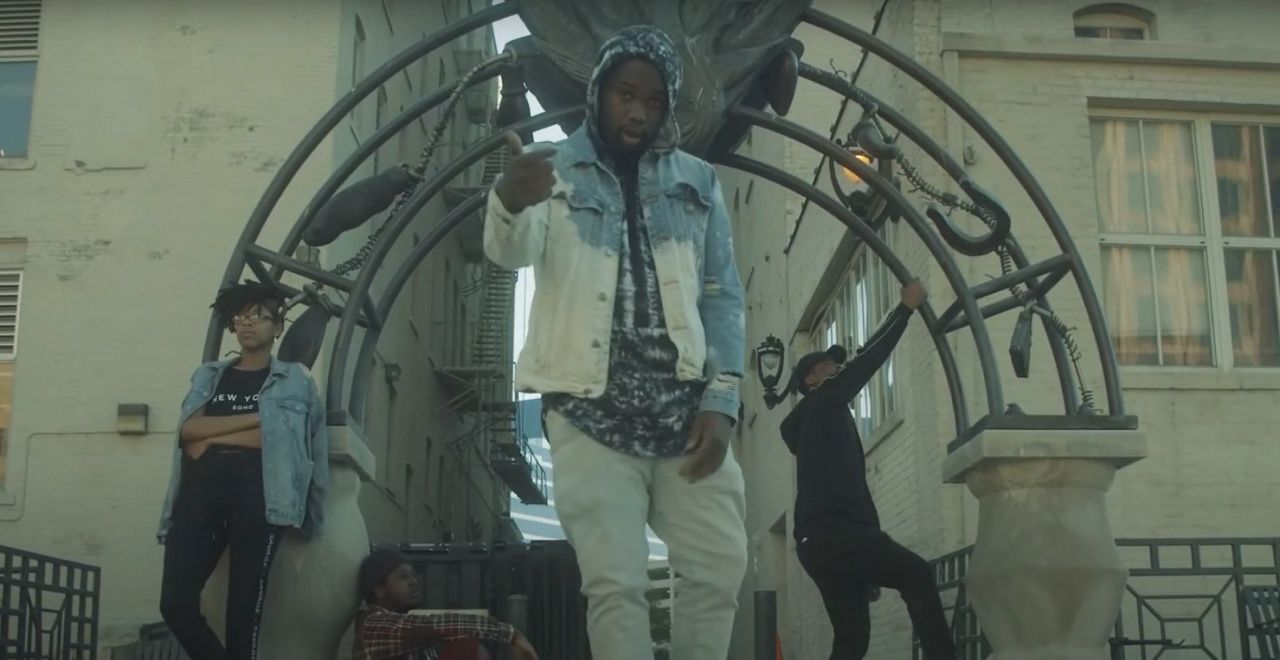MILWAUKEE, Wis. (SPECTRUM NEWS) — In a new music video, local artist Shad-i calls attention to the fact that for many Milwaukee residents, there’s “Something in the Water”: High levels of lead that can cause long-term health effects.
“Tearing up our brains, waiting for a change,” Shad-i raps in her video. “Would rather drink the rain, but you won’t count our pain.”
The video makes up part of the Hip Hop Lead Project, an initiative from community groups and local artists to raise awareness of lead exposure in Milwaukee. In July, they released their four short music videos from young performers Shad-i, Nile, Myndd, and Tommy Lee.
The project has been in the works since last year, says Jeffrey Mosser, associate director of education at the Milwaukee Repertory Theater, which spearheaded the project with funding from Northwestern Mutual. The theater also shared the videos as part of its first “REPair Divides” community dialogue session.
Mosser says the project was inspired when leaders from the Milwaukee-based Coalition on Lead Emergency (COLE) turned to the theater looking for a creative way to raise awareness about lead issues. The Repertory Theater has now joined in as one of COLE’s community partners, which also include Hephatha Lutheran Church, MICAH, Interfaith Earth Network, League of Women Voters, Dominican Center, and Amani United.
Lead exposure has been a persistent problem in Wisconsin, with Milwaukee being one of the biggest hotspots for lead poisoning in the state, as the COLE website notes. People — and especially kids — exposed to lead through old paint or water pipes can face lifelong physical and developmental symptoms, including learning difficulties, mood disorders, or digestive issues.
In 2016, the most recent data available, the City of Milwaukee Health Department reports that nearly 3,000 children they tested showed unsafe levels of lead in their blood. And, as a statewide report from that year points out, lead poisoning affects Black communities at higher rates: Out of the group they tested, 13.2% of African American children had high lead levels, compared to 2.8% of white children.
COLE co-founder Richard Diaz says the lead issue is just another example of health disparities in overlooked neighborhoods.
“What we know is that our neighborhoods are oversaturated with everything negative and everything that hurts us,” Diaz says. “Like blighted properties, or even looking at trash and littering, or looking at the kinds of products that are sold in neighborhoods that are labeled as food deserts.”
Diaz also points out that many of the areas most affected by lead poisoning are ones with high poverty rates, so that residents don’t have the resources to pay for lead removal or abatement measures — and many of the stores in these neighborhoods don’t sell the filters that can help families purify their water. Changing these statistics will require support from business leaders and elected officials, he says.
To highlight the issue of lead poisoning in Milwaukee, the Repertory Theater brought on several community partners and joined forces with Kiran Vedula, a local musician and producer who goes by the artist name Q the Sun. The four featured artists are all young performers from around the Amani neighborhood — an area with some of the highest lead poisoning rates in the city, according to health department data.
Mosser says the original plan was to have a series of workshops and possibly produce a longer album, but when COVID-19 struck, the team had to adapt. Despite the tough circumstances, the four artists were still motivated to keep going with the project, he says.
Myndd, one of the musicians, says he was inspired by the chance to speak on the lead issues and racial disparity he sees in his community.
“When I heard about it, I had to be onboard,” he says. “The message was really powerful to me.”
Vedula says he helped each of the artists hone their lyrics through one-on-one writing sessions, then recorded their final tracks, which are about a minute apiece. They filmed all of the videos in one day at different outdoor locations across the city. This way, Vedula says, they were all able to appear in each other’s videos, which created “a good feeling of solidarity.”
And the videos don’t just focus on lead awareness. In a time when the COVID-19 pandemic and Black Lives Matter protests are dominating the headlines, Vedula says they also wanted to bring in other social issues and inspire people to be engaged.
“Gotta make a change, not in office, it starts with us people,” Myndd raps in his video. “Be like Malcolm and Martin.”
Mosser says they’re now looking for ways to bring the music videos to a wider audience, like by sharing them as on-air PSAs or letting legislators use them as educational tools. He says he feels lucky that they were able to use music to communicate an important message, because art can be a powerful tool for change.
Diaz says COLE is working to train residents as neighborhood educators on lead safety — which will also help with workforce development in the community — and advocating for legislation to address lead issues. He says COLE wants to keep engaging with local youth and bringing them into the group’s community organizing efforts.
“We really want to help to build the platform of COLE, and also simultaneously build the platform for these young people to have their voices heard about issues that they care about,” Diaz says. “Issues that have affected the physiological growth and development of a neighborhood — of an entire people.”
